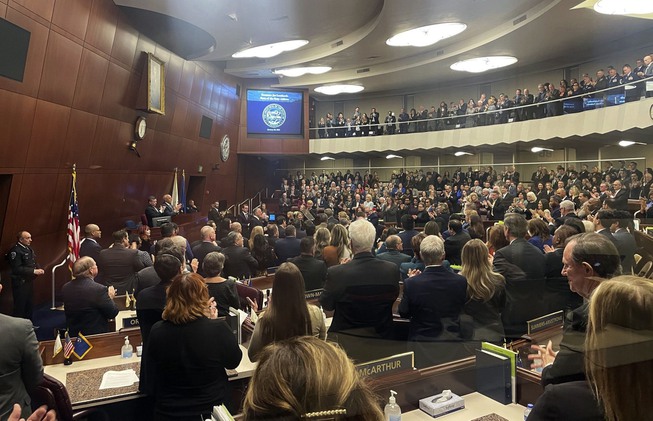
Gabe Stern / AP
New Republican Gov. Joe Lombardo gives his first State of the State address to a packed joint-session of the Democratic-controlled Legislature in the Assembly Chambers in Carson City, Nev., on Jan. 23, 2023. Nevada lawmakers convened in Carson City on Monday, Feb. 6, to start four months of negotiations, hearings and votes that will define Nevada’s state budget and operations for the next two years.
Sunday, June 25, 2023 | 2 a.m.
The Nevada Legislature this spring approved measures to toughen student discipline, provide an incentive for districts to give staff salary increases and more. Here’s a sampling of what was signed into law:
Assembly Bill 73: Allows public school graduates statewide to wear culturally significant adornments with their caps and gowns. Previously, graduation dress codes were a local or school-based decision.
Assembly Bill 175: Will add four appointed, nonvoting advisory members to CCSD’s School Board. Under the law, which takes effect in July, the city councils of Las Vegas, Henderson and North Las Vegas, and the Clark County Commission, will each appoint a person to join the seven elected members of CCSD’s often-fractured board. The board vigorously fought the hybrid board concept, which only affects CCSD; earlier this month School Board President Evelyn Garcia Morales said, without elaborating, that the board would “research our options as it pertains to the implementation.”
Assembly Bill 241: Makes the “college and career ready” diploma the default pathway instead of the “standard” diploma for the state’s public high schools. Nevada schools offer five diploma types of differing rigor for general education, alternative and special education students. Starting in 2024, students will begin high school on the college and career ready path, the most demanding of the options. They will still be able to pursue a standard diploma upon request.
Assembly Bill 285 / Assembly Bill 330: Drops the requirement that each of the state’s school district have a restorative justice discipline plan, allow administrators to remove, suspend or expel violent and disruptive students without creating an individual restorative justice plan first, and drop the age for suspension and expulsion from 11 to 6. The new laws will also require plans for students to reintegrate after being suspended or expelled, require demographic data transparency and codify the appeals process for suspensions and expulsions.
Assembly Bill 400: In addition to putting the possibility of retention back into the state’s Read by Grade 3 law, Gov. Joe Lombardo’s omnibus education bill will accomplish the following: create a statewide Early Childhood Literacy and Readiness Account and fund it with $140 million; allow cities and counties to sponsor charter schools, with some restrictions; allot $7 million for busing for charter schools; expand the state scholarship fund for teachers at the undergraduate and graduate levels by at least $4 million; and expand the scope of the Commission on School Funding.
Notably removed from the bill: A Lombardo-driven expansion of “opportunity scholarships,” which grant state money for children to attend private schools.
Assembly Bill 519: Allocates $64.5 million to the Elko County School District for a new PK-12 school in Owyhee on the Duck Valley Indian Reservation and directs Elko County to raise its property taxes for school buildings. It also allows other rural counties to do the same, collecting proceeds in a new state fund just for their school building needs. That fund will be seeded with $50 million, $25 million of which will be for tribal schools.
Senate Bill 231: Creates a statewide $250 million pot of matching funds to encourage school districts to give raises to teachers and school support staff. The matching funds will go to traditional public school districts, but not charter schools.
Senate Bill 292: Makes principals at-will employees and subject to contract nonrenewal if, for two consecutive school years, their state school rating drops one or more levels or stays at the lowest possible level and at least half of their teachers request a transfer to another campus.
Senate Bill 434: Makes substitute teachers eligible for a pension from Nevada’s Public Employees’ Retirement System.
